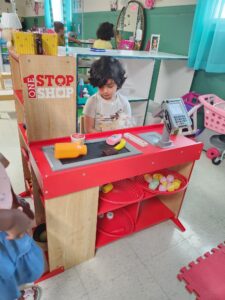 Benefits of Role Play in Early Childhood As children grow and develop, their imaginative play becomes an integral part of their learning process. From playing house to pretending to be doctors or firefighters, the benefits of role play in early childhood are significant and long-lasting. In this blog, we will delve into the advantages of role play and why it should be encouraged and nurtured in every child’s early years.
Benefits of Role Play in Early Childhood As children grow and develop, their imaginative play becomes an integral part of their learning process. From playing house to pretending to be doctors or firefighters, the benefits of role play in early childhood are significant and long-lasting. In this blog, we will delve into the advantages of role play and why it should be encouraged and nurtured in every child’s early years.
Enhances Cognitive Development:
Role play engages a child’s cognitive abilities, stimulating their imagination and creativity. By assuming various roles, children can develop problem-solving skills as they encounter different scenarios and find solutions. They learn to think critically, make decisions, and organize their thoughts.
Promotes Social and Emotional Development:
Role play provides an opportunity for children to practice and refine their social skills. Through pretend play, they learn about cooperation, negotiation, and turn-taking. As they interact with others, they develop empathy and understanding, learning to consider the thoughts and feelings of others.
Language and Communication Skills:
 Engaging in role play exposes children to a variety of vocabulary and language structures. They use language to communicate with their playmates, negotiate roles, and establish rules. Pretend play encourages storytelling and imaginative narratives, fostering the development of language comprehension, vocabulary expansion, and narrative skills. As children create and participate in different roles, they practice using language in different contexts, improving their communication abilities.
Engaging in role play exposes children to a variety of vocabulary and language structures. They use language to communicate with their playmates, negotiate roles, and establish rules. Pretend play encourages storytelling and imaginative narratives, fostering the development of language comprehension, vocabulary expansion, and narrative skills. As children create and participate in different roles, they practice using language in different contexts, improving their communication abilities.
Encourages Creativity and Imagination:
Role play is the realm of boundless imagination, where children can transform into anyone or anything they desire. This freedom to create and imagine builds their creative thinking skills, allowing them to generate unique ideas and solutions. Through role play, children can explore different scenarios, experiment with different roles and perspectives, and think outside the box. This imaginative play nurtures their creativity, which will be invaluable throughout their lives.
Development:
Role play often involves physical movements and actions, contributing to the development of fine and gross motor skills. Role play holds tremendous benefits for young children, supporting their cognitive, social, emotional, and physical development. It nurtures their creativity, fosters language skills, and enhances their understanding of the world.
